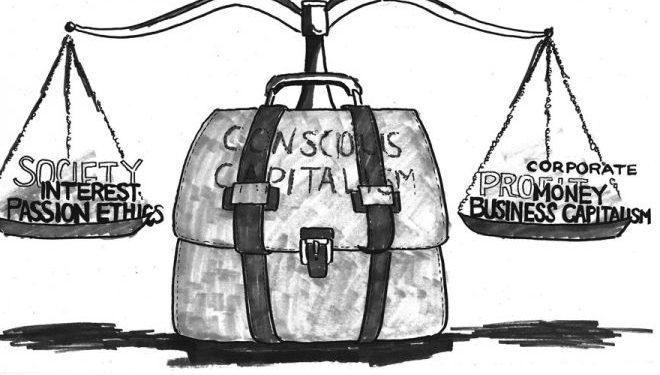Companies have long justified sustainability initiatives as a way to boost their reputation, comply with external and internal standards, or generate incremental profits. But the initiatives are rarely transformative, because markets disregard ecological limits and social goals, rewarding firms that burn through resources and often punishing those with regenerative models. No matter how compelling the business case, corporate sustainability strategies cannot escape their structural misalignment with the logic of our current economic system. The problem runs deeper than many realise. In the absence of the narrative infrastructure needed to reshape economic logic, all the sophisticated sustainability standards and metrics we have developed – the technical infrastructure – are insufficient.
Our efforts remain hostage to the quarterly earnings dance, and companies that should be leaders on sustainability are instead cautionary tales. Consider a hypothetical manufacturing company that designs products for complete circularity: every material input retains value indefinitely through continuous reuse. This would dramatically reduce the company’s material costs and insulate it from volatile commodity prices. But today’s markets, which are accustomed to business models based on linear extraction, would see only the high upfront investment demands. With investors favouring immediate returns over long-term value creation, and credit agencies struggling to price the benefits of resilience into ratings decisions, the circular manufacturer ends up starved of investment, while its resource-burning competitors have ample access to lower-cost capital. Rewarding companies for externalising costs is economic insanity disguised as financial prudence. That is why we must initiate a shift to what I call “aligned capitalism.” In such a system, ecological impacts would be priced into markets, regulators would reward ecosystem restoration, and investors would compete on resilience.
Financial statements would capture natural and social capital, while credit ratings would factor in equity and environmental preparedness. In other words, sustainability would move from cost centre to profit engine. Under this system, our hypothetical circular manufacturer would flourish. The resource efficiency and supply-chain independence of such companies would deliver huge advantages. As materials become scarcer and more expensive, and trade becomes increasingly fractious, these companies would be able to build competitive moats that strengthen over time. Of course, to change the economic logic, all stakeholders in the political economy – from board members to regulatory agencies, trade unions, local communities, and civil-society organisations – must do their part. But smart corporate leaders will not wait for others to act. They can demonstrate what good business looks like when systems align with environmental and social realities. The recent backlash against environmental, social, and governance (ESG) commitments makes this even more important.
Also Read: Off The Leash
The first and most important step is to construct the missing narrative infrastructure. Business leaders must engage in strategic, evidence-based storytelling that links corporate actions to broader realities and build trust within and outside boardrooms by entering into dialogues with stakeholders that outlast political cycles. They should also invest in research that demonstrates the superior outcomes of aligned practices. Some companies are getting it right. The Brazilian cosmetics group Natura’s partnerships with indigenous communities have improved business results and social outcomes. Interface, the global flooring manufacturer, has inspired other companies with its Mission Zero commitment, which resulted in a 74% reduction in its carpets’ carbon footprint. Schneider Electric, an energy-management and digital-automation company, has made sustainability a central part of its business strategy, embedding it deeply into its operations. These companies’ narratives helped create the economic logic that rewards their sustainability practices, setting the stage for regulatory and market shifts. But corporate behaviour is just one piece of the puzzle.
To promote coordinated action, firms must adopt governance structures designed for advocacy, not just compliance, and then advocate for regulatory reform that entrenches environmental and social criteria in financial disclosures and decision-making. Regulators, for their part, must mandate the inclusion of comprehensive ecological-social disclosures in financial statements and set ambitious timelines for system realignment. Investors also play a crucial role, especially because regulation follows, as much as it leads, market pressure. Investors must integrate resilience criteria into their mandates, develop new valuation methodologies, and compete on long-term value creation rather than quarterly profits. The smartest asset managers are already building these capabilities, recognising that tomorrow’s winners will be companies that thrive within ecological and social boundaries. Lastly, business schools should teach ecological and social literacy, as well as how to shape future economic realities as part of their core curricula. Today’s MBA students will inherit an economy in transition – whether orderly or disorderly – and need the tools to lead that transformation, instead of just managing resources within existing constraints. Under aligned capitalism, today’s marginal business models can become profitable. Product-as-a-service companies could generate steady returns. With environmental benefits bringing cost advantages, carbon-negative manufacturers could scale rapidly. Firms focused on workforce development and community healthcare could earn direct payments for delivering positive social outcomes. To create a system where sustainability is the natural winner, business leaders must first recognise that the current economic framework is fundamentally misaligned with ecological and social realities– the markets rarely reward transformative ESG initiatives, and that is unlikely to change.
A better form of capitalism, under which the most regenerative and sustainable strategies are also the most profitable, is possible. But it will require executives to spur coordinated action among investors, regulators, and all of their stakeholders. When the dust settles, those who had the courage to act first will be the new market leaders.






































